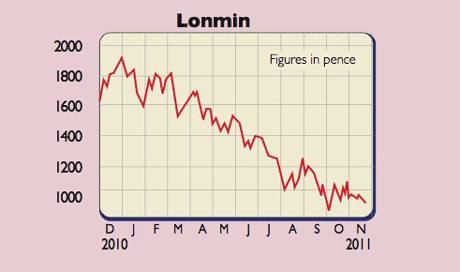
James Dinnison, a 25-year-old college dropout, earns £125,000 a year working as a miner in Australia – that’s three times higher than the national average. However, rising unemployment and cooling commodity consumption by China will eventually bring these super-charged salaries down to earth. That’s just as well for the likes of Lonmin, the world’s third-largest platinum producer. It operates exclusively in South Africa and was recently forced to stomach an inflation-busting 8% wage settlement after an illegal strike stopped production at its Karee operation.
Going forward, the City is expecting more of the same. Yet I suspect in reality wages will be tempered, as the international labour market slows. Platinum is a precious metal used in jewellery and in catalytic converters for diesel engines. Here growth is being driven by stricter environmental standards and a shift towards more fuel-efficient cars. Emissions targets are broadening too, with the next wave of legislation set to be introduced for trucks, trains and off-road vehicles such as tractors, agricultural and construction equipment.
To satisfy demand, chief executive Ian Farmer aims to invest $2bn over the next four years, subject to market conditions. Output will ramp up from 720,000 ounces to 750,000 ounces in 2012, and onwards to 950,000 ounces by 2015. That represents an average annual growth rate of nearly 7%. Historically, the Marikana operations have produced 950,000 ounces of platinum, he says, referring to the firm’s flagship mine and smelter. “We’re confident the asset can produce at these levels again.”
Lonmin ( LSE: LMI
), rated OUTPERFORM by RBC Capital
In terms of the numbers, analysts are predicting 2012 turnover and adjusted earnings per share (EPS) of $1.3bn and 68p respectively, plus a 1.4% dividend yield. Given the positive earnings growth, I rate the group on a through-cycle multiple of seven times earnings before interest, tax, depreciation and amortisation (EBITDA). After adjusting for the $234m of net debt, that delivers an intrinsic worth of £13.50 a share.
Lonmin is not without risk. Like its peers, it is exposed to the volatile metals and foreign-exchange markets (in particular the rand and the dollar). It is also being plagued by plant failures, accidents and industrial action. Additionally, there is a fair dose of geopolitical risk to consider due to the rising tide of ‘resource nationalism’. Further out, there is also the possibility of new materials being developed that could substitute for platinum in catalytic converters. Nonetheless, there is scope to beat consensus estimates, so Lonmin looks well placed to benefit from the broad trend towards greener fuels. Investment bank RBC has a price target of £14.
Rating: BUY at 963p
• Paul Hill also writes a weekly share-tipping newsletter, Precision Guided Investments. See
www.moneyweek.com/PGI
, or phone 020-7633 3634 for more.